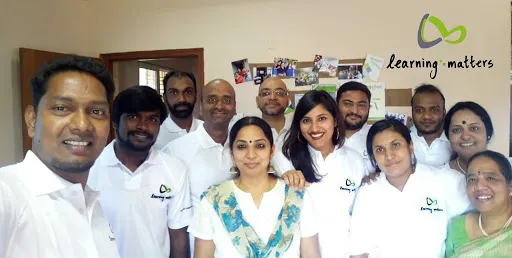This Bengaluru edtech startup makes lessons come alive using Alexa and videos
Having recognised the need for school education to become more engaging – especially in rural and semi-urban schools - three colleagues came together to launch Learning Matters, a technology-driven solution that not only makes learning more engaging but also helps teachers upgrade their skills.
At the Learning Matters office in a quiet lane of a South Bengaluru suburb, two people are testing the speech recognition capabilities of Amazon’s virtual assistant, Alexa, to explain the nuances of English grammar.
Running the session is Tara, the dynamic, voice-assisted virtual teacher. When you get an answer right, she commends you. When you get an answer wrong, she patiently explains why it was wrong and what the correct answer was.
Tara is just one of the many creative technology-driven solutions created by the Bengaluru-based edtech startup set up in 2016 by Ramamoorthy G (aka Moorthy), Gowri Mahesh, and Saras Ramamoorthy. (More about Tara later in the story.)

Learning Matters Founders (L-R) Saras Ramamoorthy, Ramamoorthy G, and Gowri Mahesh are working on creating tech-driven solutions for the education sector.
The ABC of Learning Matters
Saras and Gowri have been friends since school and had worked with Moorthy at Pearson, creating digital learning materials for the world-famous academic publisher. Moorthy had switched over from his career in IT at companies like Accenture, to work in education, first with Tutor Vista, which was eventually acquired by Pearson.
Between them, they had all the skills a team needed to solve a key problem in India – high quality education at affordable rates, especially in rural and semi-urban schools. Having worked in the field for over a decade, they felt there was so much that could be done using technology, but nobody was taking on the challenge.
It is a sad truth that any parent who can afford to send their child to a private, English-medium school does exactly that. However, despite their best efforts, the quality of education at many of these schools in rural and semi-urban areas leaves a lot to be desired.
Moorthy sounded off Gowri and Saras about his idea to transform school education by making learning more engaging for students, so they understand new concepts and learn how to apply them. The result was Learning Matters, which was officially launched in mid-2016. It provides teachers and students in remote, rural, and semi-urban schools the tools they need to make learning not just more enjoyable but also more long lasting.
Getting to the root of the learning problem
Learning Matters offers four (related) products: the Star Teacher programme, the Star Teacher Tool Box, Tara (the cloud-based, NLP-powered virtual voice teacher), and Kengine, a curated library of learning videos from across the world, translated into Indian languages.
Kengine, in fact, was their first product - a digital content platform that brings concepts to life, transforming the teaching and learning experience. Videos on Kengine can be played on any device, and go a long way in helping teachers supplement their lessons. It allows teachers to add their own notes and run quizzes on the topic of the video.
Star Teacher – as the name says – is aimed at upskilling teachers.
“We focus on teacher quality because if you want to improve student outcomes, the way students learn needs to change. This, in turn, (positively) impacts their career outcomes and even their lives in the long run. All this goes back to their teachers, because they are the ones that influence the students the most in their formative years,” explains Saras, who is also the Chief Product Officer.

The founders of Learning Matters along with the team at their Bengaluru office
The programme – which has been taken up by schools in places like Kumbakonam, Melkote, Ganapathi Agraharam, and more – focuses on upskilling teachers to understand child psychology and concepts related to early-childhood learning, again using tech-enabled solutions.
“A lot of the teachers in rural and semi-urban schools have no exposure to concepts like child psychology, or concepts related to early childhood learning, or engaging teaching methods,” Gowri says.
“They don’t know how to make charts and use them as visual aids, or how to get their students – mostly first-generation learners - to complete their homework. Principals at these schools want to make learning more effective, they want to see their students succeed, but don’t know how to go about it,” she adds.
Teachers have now learnt innovative methods, which mean students are no longer doing homework that involves writing an answer five times. Instead, they are doing homework that is more interesting to do.
“One principal told us that earlier, if a teacher didn’t reach a class on time, the students would become boisterous. Today, if that happens, they come to the staff room to remind the teachers,” says Saras.
The Star Teacher programme follows what the founders call a 3-3-3 approach – three in-person training programmes at the schools conducted by experts from Learning Matters across the academic year. This is mixed with three video conferencing sessions from the same trainers. Shoring this up are one-on-one phone calls that teachers have with the trainers-cum-mentors.
“This individual attention allows the teachers to share their challenges and discuss solutions with Chenda Jayachandran, our Head of Academics,” explains Gowri, COO at Learning Matters.
This model brings down the cost for the school, which ranges anywhere between Rs 70 and Rs 110 per student per month.
Technology for good
In order to further bring down or at least keep costs at that level, the team has brought in more technology. It chose Communicative English – a lucrative industry on its own – as the first programme to be delivered by an Alexa-powered voice teacher named Tara.

An image of Tara, the Alexa-powered voice teacher from Learning Matters
“Grammar is taught implicitly – there are no boring lessons. And it is context-based. The lessons take into account real-life situations where students can use their newly-acquired knowledge of English,” Saras says. Eventually, even large portions of the Star Teacher programme will be delivered by Alexa.
“One of the biggest challenges teachers at such schools have is that they don’t always know how to deliver a lesson in an exciting, engaging manner. We are working on a solution where a teacher can use an Alexa-powered device at school to get tips and information on activities they can run to teach a concept, say, like photosynthesis for Class 5 students,” Gowri outlines.
So far, demos of Tara have been met with sheer disbelief at these schools. “It talks!?” has been a common reaction. The excitement that follows when Tara answers their questions or pays them a compliment is amazing.
Says Gomathi Sankar, CTO, “We have transformed the technology used in voice assistants of Google or Amazon to create Tara. We have seamlessly integrated Amazon Alexa’s hardware and speech-recognition capabilities with our in-house content and teaching expertise.”
It doesn’t stop there. Learning Matters has big plans for Tara. “We have also created a back-end platform that allows our content developers to create lessons and simultaneously simplify the programmes going into Tara,” he explains.
Tara was launched in two schools in Kumbakonam district of Tamil Nadu last week.
Activity-based learning for long-term success
Another aspect of making classroom learning more engaging where teachers don’t have resources is the Tool Box. These are learning aids that can often be used across many classes and subjects. They bring an element of gamification and reinforce learning through fun.

A visual of the human digestive system, which is part of the Star Teacher Tool Box by Learning Matters.
“Kits come with a laminated board that teachers can display in classrooms to show what has been learned even after the activity is over,” says Saras. The components are easily reusable – the board’s surface is erasable. The flash cards, etc., are made of non-tearable paper. If teachers decide to customise a Tool Box, they can easily use the reverse of the cards and then erase it for the next activity.
“Many of the students have never moved out of their seats for an actual activity. The teachers too never knew they could do something differently. Today, we get inquiries from teachers asking if they can buy a Tool Box on their own,” observes Gowri.
Evolving business models
Such enquiries have prompted Learning Matters to consider going beyond the B2B market they serve today to the B2B2C segment, where parents too can purchase learning material. They’re also looking at a direct B2C model where students could buy a Tara-based learning module.
“This solution can work for hours together without any human intervention,” points out Moorthy, the CEO at the startup.
And a lack of human intervention, i.e. using technology in a big way, means that solutions can scale.
“Scalability is not an issue. Once we bring in more technology, a lot of our Star Teacher training programmes can also be decentralised,” he explains.
In a market like India, where school-level education is crying out for attention, continuing with individual attention is critical while maintaining costs at current levels. Interestingly, the team has never given out freebies or offered deep discounts.
“We make a profit on every sale,” he says. The founders set up the company with funding from friends and family, and is essentially bootstrapped. The team of 14 in-house is supplemented by dozens of subject matter experts who work as consultants.
What has kept them going these past three years has been the response from the schools they work with – students, teachers, and principals.




![[Startup Bharat] Meet edtech startups that are taking quality education to non-metro cities acr...](https://images.yourstory.com/cs/2/3fb20ae0-2dc9-11e9-af58-c17e6cc3d915/Awarness-camp1551780810897.png?fm=png&auto=format&h=100&w=100&crop=entropy&fit=crop)
![[Startup Bharat] College dropout sets up an edtech platform to connect students to schools, col...](https://images.yourstory.com/cs/2/79900dd0-d913-11e8-a160-45a90309d734/Campus_Varta_collage1560926350849.png?fm=png&auto=format&h=100&w=100&crop=entropy&fit=crop)
![[Startup Bharat] IIT Kharagpur alumni’s edtech startup is helping students make the correct car...](https://images.yourstory.com/cs/2/a9efa9c0-2dd9-11e9-adc5-2d913c55075e/Final_lcat21559129800558.png?fm=png&auto=format&h=100&w=100&crop=entropy&fit=crop)

![[Startup Bharat] How edtech startups are bridging the gaps in education in Tier II and III Indi...](https://images.yourstory.com/cs/2/3fb20ae0-2dc9-11e9-af58-c17e6cc3d915/innovation-in-edutech21560260875557.png?fm=png&auto=format&h=100&w=100&crop=entropy&fit=crop)





